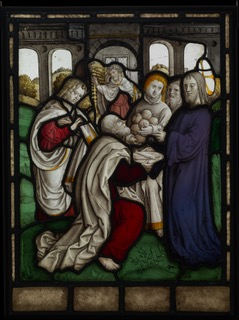Sunday Reflection with Canon Robin Gibbons - 27 July 2024

Miracle of the Loaves and Fishes (one of 12 scenes from The Life of Christ) by Jan Rombouts (MET, 44.114.5) Wiki image
Seventeenth Sunday in Ordinary Time
'God can make much of what we offer!' is a phrase that I read when mulling over this Sunday's gospel of the feeding of the five thousand and it has made an impact on the way I wrestle with tis gospel. Part of the problem is my own sense that this miraculous ability to multiply food never occurs in areas where people are wretchedly starving, I just wish we had an Elisha or Jesus to deal with the issues of poverty and world hunger, but I ask myself isn't that simply wishing away a great and enduring problem in human societies? And so that phrase 'God can make much of what we offer' is worth the time taken to reflect on what it could mean because it puts the accent onto ourselves and not an external agency, the story of both miracles-that of Elisha in 2 Kings and the feeding of the crowd as told of Jesus in John 6, draws us into their orbit an d call us to ask sevarl questions, not only did it happen, or what does it man, but far more importantly what is t telling me to do?
We can start by focussing on the paucity of food, twenty barley loaves in Elisha's story and five in Jesus tale. Compared to the apparent number of people these are as nothing, not only that barley loaves are part of a poor persons diet, so again at the wrong end of the high class diet. Does it strike you, as it now strikes me, that the generosity and gift of a person is perhaps key to understanding what is happening? In both cases there is an assumption that God will do something, and somebody, the man that came from Baal-shalishah and the boy with five barley loaves and two fish, gave it with I suspect generous hearts . The results of their loving gesture, small as it might have been had enormous consequences because of Gods blessing on their action.
Maybe this is the meaning of our scriptures, it touches me because the normal way we view things is through big acts of generosity-just look at the list of benefactors on hospital, school, university notice boards and communiqués. Is there a category for the widow's mite, the small donation? Hardly! We seem to be mesmerised by money, status, power and titles, yet these are the things Jesus tells us not to trust, or honour. Make use of them but not become enthralled to them, instead be very aware of their destructive power. Here in the simplicity of two stories that show God at work, gently it seems, the tables are turned on our arrogance and unbelief. 'What is essential is invisible to the eye' wrote St Exupery in the Little Prince- and we can add that what is essential is God's love and providence working in and with us. Yes, the hungry can and will be fed, but only if we share our gifts with them, and in doing so ask God's blessing to be with us, giver and taker alike.
I hope in this time of holiday you will find small signs of the miracle of God amongst you. I am back in my family area of France for a much needed holiday, my day in our little village punctuated by the angelus rung out at 6 30am, 12pm and 7pm, and where it seems the old wayside crosses and shrines and statues of Madonnas have been cleaned, repainted, tidied up, and so shine a little more in the world of human endeavours. It's humbling to be back where I belong, where the miracles of faith are never far from the surface of daily life. On Sunday we celebrate the village patronal feast of St Jacques ( St James the Greater) , `I shall concelebrate with my cousin who is one of the retired cures of this diocese of St Claud-and afterwards the little miracle of the feeding of the two hundred or so villagers will take place, just outside the church where we shall not only have shared the miracle of being fed with the Holy Eucharist, but also by the Bar B Q, and let it be said, St James and the Lord will be with us in the feast, making much of what we offer!
Short Summer Lectio
Sharing, from the Little World of Don Camillo
No, Don Camillo; you didn't exactly steal it. Peppone had two cigars in his pocket. Peppone is a Communist. He believes in sharing things. By skillfully relieving him of one cigar, you only took your fair share.
Giovannino Guareschi
Loaves and Fishes by David Whyte
This is not
the age of information.
This is not
the age of information.
Forget the news,
and the radio,
and the blurred screen.
This is the time of loaves
and fishes.
People are hungry,
and one good word is bread
for a thousand.


















